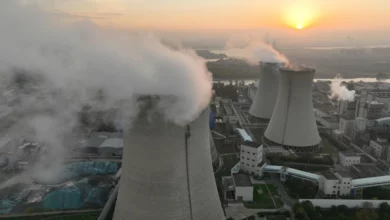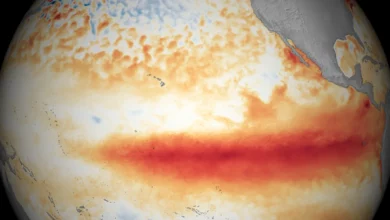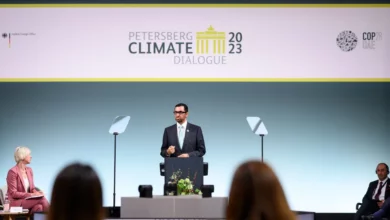In a vicious cycle with long-term implications for the climate system, the soil and the ocean are being weakened as buffers against global warming, say two new investigations.
If the seas and the land are less able to soak up or store greenhouse gases, more of these carbon emissions will enter the atmosphere, holding in even more heat from the sun.
A study published in nature on 14 July says a gradual increase in atmospheric carbon dioxide (CO2) over the last half-century has accelerated the release of methane and nitrous oxide in the soil.
These gases are respectively 25 and 300 times more effective at trapping radiation than CO2, the principal greenhouse gas by volume.
"This feedback to our changing atmosphere means that nature is not as efficient in slowing global warming as we previously thought," said Kees Jan van Groenigen, a professor at Trinity College Dublin and the paper's lead author.
Earlier studies examining how additional CO2 affects the capacity of different soils – in forests, grasslands, wetlands and agricultural fields – to either absorb or release these two gases yielded conflicting results.
When van Groenigen and colleagues reviewed 49 such studies, however, two patterns emerged. More CO2 increased nitrous oxide in all soils, but soils in rice paddies and wetlands released more methane in particular.
The culprits in both cases are microscopic soil organisms that breathe in CO2 and "exhale" methane. The more carbon dioxide in the air, the more these single-cell greenhouse-gas factories thrive.
If the calculations are right, the carbon "credit" that is attributed to faster plant growth driven by extra CO2 in the air must be revised, say the researchers.
This "credit" helps to offset the negative impact of greenhouse gases – but the new data suggests it should be written down by a fifth.
"By overlooking the key role of these two greenhouse gases, previous studies may have overestimated the potential of ecosystems to mitigate the greenhouse effect," van Groenigen said.
In the second study, published in the journal Nature Geoscience last Sunday, scientists in the United States highlight evidence that global warming is eroding the ability of the ocean to soak up CO2.
The world's seas absorb roughly one-third of all human carbon emissions, but how this "sponge" responds to rising CO2 levels is a tough question, mainly because data has been spotty geographically and hasn’t cover long time periods.
Galen McKinley, a professor at the University of Wisconsin at Madison, worked with a team that looked at three decades of observational data from the North Atlantic.
They found that rising air and water temperatures were slowing the pace at which carbon is absorbed across a large portion of the ocean's subtropical zones.
"The ocean is taking up less carbon because of the warming caused by the carbon in the atmosphere," McKinley said.
Up to now, scientists reasoned that only when carbon content in the ocean rose faster than in the atmosphere could one say that the capacity to take in CO2 had diminished.
But the new study shows that the ocean "sink" can be weakened even without this visible sign.
"More likely, what we are going to see is that the ocean will keep its equilibration [the balance between atmospheric and ocean carbon levels] but it doesn't have to take up as much carbon to do it because it's getting warmer at the same time."
She explained that warmer water cannot hold as much CO2 as colder water. As a result, as the ocean's temperature rises, its "carbon capacity" decreases.




